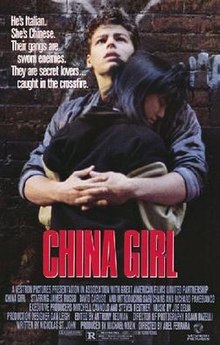China Girl (1987 film)
| China Girl | |
|---|---|
 Theatrical release poster | |
| Directed by | Abel Ferrara |
| Written by | Nicholas St. John |
| Produced by | Michael Nozik |
| Starring |
|
| Cinematography | Bojan Bazelli |
| Edited by | Anthony Redman |
| Music by | Joe Delia |
| Distributed by | Vestron Pictures |
Release date |
|
Running time | 89 minutes |
| Country | United States |
| Language | English |
| Budget | $3.5 million[1] |
| Box office | $1,262,091[2] (USA) |
China Girl is a 1987 independent neo-noir romantic thriller film directed by Abel Ferrara, and written by his longtime partner Nicholas St. John.
Story
[edit]China Girl is a contemporary take on the classic tale of Romeo and Juliet. Set in 1980s Manhattan, the plot revolves around the intimate relationship developing between Tony, a teenage boy from Little Italy, and Tye, a teenage girl from Chinatown, while both of their older brothers become engrossed in a heated gang war against each other. It also bears some similarities to the 1957 musical West Side Story, which similarly is an adaptation of Romeo and Juliet set among rival ethnic gangs in Manhattan, and also features a male protagonist named Tony.[3]
Release
[edit]The film was released theatrically on September 25, 1987 in 193 theaters and grossed $531,362 its opening weekend. the film grossed a domestic total of $1,262,091 and its widest release was to 193 theaters. After its theatrical run, the film was released on videocassette by Vestron Video. Although a Region 2 DVD has been released, a Region 1 DVD has yet to be released, although it is currently available for digital download and streaming on Tubi in the United States.
Cast
[edit]- Richard Panebianco as Tony
- Sari Chang as Tye
- James Russo as Alby
- Russell Wong as Yung Gan
- David Caruso as Mercury
- Joey Chin as Tsu Shin
- Judith Malina as Mrs. Monte
- James Hong as Gung Tu
- Robert Miano as Enrico Perito
- Paul Hipp as Nino
- Doreen Chan as Gau Shing
- Randy Sabusawa as Ma Fan
- Keenan Leung as Ying Tz
- Lum Chang Pan as Da Shan
- Sammy Lee as Mohawk
Critical reception
[edit]The staff at Variety magazine said of the film, "China Girl is a masterfully directed, uncompromising drama and romance centering on gang rumbles (imaginary) between the neighboring Chinatown and Little Italy communities in New York City" and they especially praised the performances of Russell Wong and Joey Chin saying "Russell Wong (as handsome as a shirt ad model) and sidekick Joey Chin dominate their scenes as the young Chinese gang leaders."[4]
Time Out magazine wrote that the film is a "superior exploitation picture – tough, stylish but often painfully misjudged reworking of Romeo and Juliet, with rival teenage gangs battling it out, sparked by the inter racial love affair between an Italian (Panebianco) and a Chinese girl (Chang), Ferrara makes excellent use of the Chinatown and Little Italy locations, and delivers the choreographed violence with his usual muscular panache" and that "The major strength of the script is its accommodation of three generations: the elders and their aspiring sons are seen to conspire against the warring youngsters, putting money before family."[5]
Jonathan Rosenbaum of the Chicago Reader praised the film's photography and action scenes calling them "Bojan Bazelli's location photography is luminous and exciting, and the battle lines charted in Nicholas St. John's script are fairly complex."[6]
References
[edit]- ^ "AFI|Catalog".
- ^ "China Girl". Box Office Mojo.
- ^ Della Gatta, Carla (2023). Latinx Shakespeares: Staging US Intracultural Theater. Ann Arbor: University of Michigan Press. p. 52. ISBN 978-0-472-05577-7.
- ^ Variety Staff (January 1, 1987). "China Girl". Variety. Retrieved September 11, 2021.
- ^ "China Girl". Time Out London. September 10, 2012. Retrieved March 25, 2021.
- ^ Rosenbaum, Jonathan. "China Girl". Chicago Reader. Archived from the original on October 30, 2013. Retrieved March 25, 2014.
External links
[edit]- 1987 films
- 1987 crime drama films
- 1987 independent films
- 1987 romantic drama films
- 1980s English-language films
- American crime drama films
- American independent films
- American romantic drama films
- Films about Chinese Americans
- Films about interracial romance
- Films based on Romeo and Juliet
- Films directed by Abel Ferrara
- Films produced by Michael Nozik
- Films scored by Joe Delia
- Modern adaptations of works by William Shakespeare
- Vestron Pictures films
- 1980s American films
- Films set in New York City
- Films shot in New York City
- English-language independent films
- English-language crime drama films
- English-language romantic drama films
